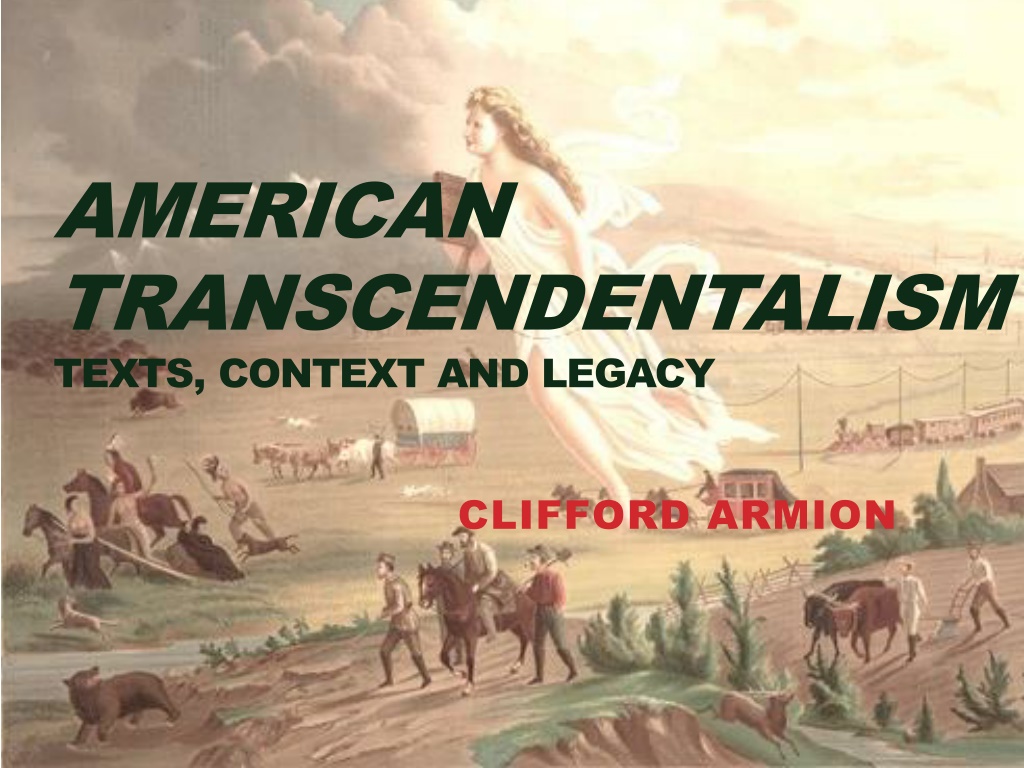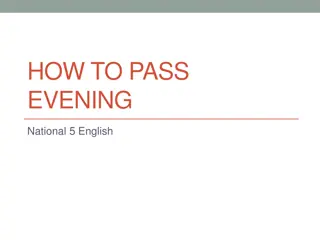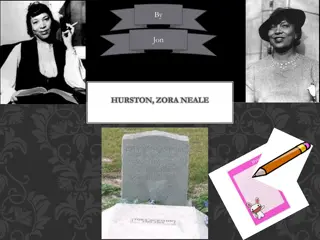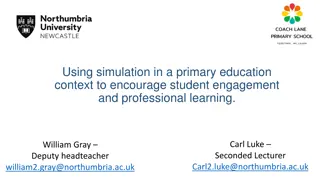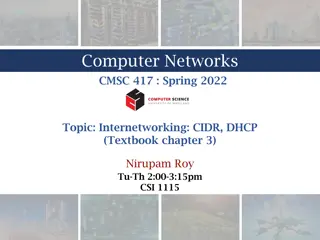Exploring American Transcendentalism: Texts, Context, and Legacy
Delve into the origins, core beliefs, major figures, and influences of American Transcendentalism, a movement that emerged in reaction to prevailing intellectual theories regarding spirituality, social life, education, and nature. Discover the thoughts of prominent figures like Ralph Waldo Emerson on education and society's relationship with the concept.
Download Presentation
Please find below an Image/Link to download the presentation.
The content on the website is provided AS IS for your information and personal use only. It may not be sold, licensed, or shared on other websites without obtaining consent from the author. Download presentation by click this link. If you encounter any issues during the download, it is possible that the publisher has removed the file from their server.
Presentation Transcript
AMERICAN TRANSCENDENTALISM TEXTS, CONTEXT AND LEGACY CLIFFORD ARMION
WHAT WILL BE DISCUSSED TONIGHT Origins and definition of the movement Transcendentalism and education Transcendentalism and nature
CORE BELIEFS The movement developed as a reaction to prevalent intellectual theories about: - Spirituality (men are not inherently corrupted) - Social life (society away from nature corrupts men necessity of self-reliance) - Education approach) (seminars instead of lectures pragmatic - Nature (intrinsic value birth of ecology)
INFLUENCES - European romanticism (notion of isolation, contemplation of nature (although different)) - Hume s skepticism (questioning existing theories and contradicting them with observation and intuition) new theories based on - transcendental philosophy (reflecting on the Kant s process of producing objective knowledge out of intuition and observation).
MAJOR FIGURES Frederic Henry Hedge, Ralph Waldo Emerson, George and Sophia Ripley, Bronson Alcott, Orestes Parker, Henry David Thoreau, Channing, James Freeman Clarke, Christopher Pearse Cranch, Convers Francis, Sylvester Judd, Jones Very, Margaret Fuller, Elizabeth Peabody, and Ellen Sturgis Hooper. George Putnam, Theodore Henry Brownson, William
EMERSON ON EDUCATION If he be dexterous, his tuition should make it appear; if he be capable of dividing men by the trenchant sword of his thought, education should unsheathe and sharpen it; if he is one to cement society by his all- reconciling affinities, action! oh! hasten their
EMERSON ON EDUCATION It is ominous, a presumption of crime, that this word Education has so cold, so hopeless a sound. A treatise on education, a convention for education, a lecture, a system, affects us with slight paralysis and a certain yawning of the jaws.
EMERSON ON EDUCATION I suffer whenever I see that common sight of a parent or senior imposing his opinion and way of thinking and being on a young soul to which they are totally unfit. Cannot we let people be themselves, and enjoy life in their own way? You are trying to make that man another you. One's enough.
EMERSON ON EDUCATION Is it not true that every landscape I behold, every friend I meet, every act I perform, every pain I suffer, leaves me a different being from that they found me?
THOREAUS WALDEN I have ( ) spent the hours of midnight fishing from a boat by moonlight, serenaded by owls and foxes, and hearing, from time to time, the creaking note of some unknown bird close at hand. These experiences were very memorable and valuable to me--anchored in forty feet of water, and twenty or thirty rods from sometimes by thousands of small perch and shiners, dimpling the surface with their tails in the moonlight, and communicating by a long flaxen line with mysterious nocturnal fishes which had their dwelling forty feet below, or sometimes dragging sixty feet of line about the pond as I drifted in the gentle night breeze, now and then feeling a slight vibration along it, indicative of some life prowling about its extremity, of dull uncertain blundering purpose there, and slow to make up its mind. the shore, surrounded
THOREAUS WALDEN At length you slowly raise, pulling hand over hand, some horned pout squeaking and squirming to the upper air. It was very queer, especially in dark nights, when your thoughts had wandered to vast and cosmogonal themes in other spheres, to feel this faint jerk, which came to interrupt your dreams and link you to Nature again. It seemed as if I might next cast my line upward into the air, as well as downward into this element, which was scarcely more dense. Thus I caught two fishes as it were with one hook.
THOREAUS WALDEN - Anthropocentric vision of nature (Romantics) - The contemplation of nature and the memory of it is as source of pleasure (Romantics) - There is purpose and sacredness in nature (NEW)
EMERSON ON NATURE The stems of pines, hemlocks, and oaks, almost gleam like iron on incommunicable trees begin to persuade us to live with them, and quit our life of solemn trifles. Here no history, or church, or state, is interpolated on the divine sky and the immortal year. How easily we might walk onward into opening landscape, absorbed by new pictures, and by thoughts fast succeeding each other, until by degrees the recollection of home was crowded out of the mind, all memory obliterated by the tyranny of the present, and we were led in triumph by nature. the excited eye. The
THE TRANSPARENT EYE-BALL In the woods, we return to reason and faith. There I feel that nothing can befall me in life, - no disgrace, no calamity, (leaving me my eyes,) which nature cannot repair. Standing on the bare ground, - my head bathed by the blithe air, and uplifted into infinite space, - all mean egotism vanishes. I become a transparent eye-ball; I am nothing; I see all; the currents of the Universal Being circulate through me; I am part or particle of God.
EMERSON - THE RHODORA, 1847 On being asked, whence is the flower. In May, when sea-winds pierced our solitudes, I found the fresh Rhodora in the woods, Spreading its leafless blooms in a damp nook, To please the desert and the sluggish brook. The purple petals fallen in the pool Made the black water with their beauty gay; Here might the red-bird come his plumes to cool, And court the flower that cheapens his array. Rhodora! if the sages ask thee why This charm is wasted on the earth and sky, Tell them, dear, that, if eyes were made for seeing, Then beauty is its own excuse for Being; Why thou wert there, O rival of the rose! I never thought to ask; I never knew; But in my simple ignorance suppose The self-same power that brought me there, brought you. WORDSWORTH - DAFFODILS, C.1805 I wandered lonely as a cloud That floats on high o'er vales and hills, When all at once I saw a crowd, A host, of golden daffodils; Beside the lake, beneath the trees, Fluttering and dancing in the breeze. ( ) The waves beside them danced; but they Out-did the sparkling waves in glee: A poet could not but be gay, In such a jocund company: I gazed and gazed but little thought What wealth the show to me had brought: For oft, when on my couch I lie In vacant or in pensive mood, They flash upon that inward eye Which is the bliss of solitude; And then my heart with pleasure fills, And dances with the daffodils.
AMERICAN PROGRESS, JOHN GAST, C.1872 Darkness Light
JOHN MUIR, JOHN MUIR, THE MOUNTAINS OF THE MOUNTAINS OF CALIFORNIA CALIFORNIA, 1894 , 1894 No great valley or lake is seen, or river, or group of well-marked features of any kind, standing out in distinct pictures. Even the summit-peaks, so clear and high in the sky, seem comparatively smooth and featureless. Nevertheless, glaciers are still at work in the shadows of the peaks, and thousands of lakes and meadows shine and bloom beneath them, and the whole range is furrowed with ca ons to a depth of from 2000 to 5000 feet, in which once flowed majestic glaciers, and in which now flow and sing a band of beautiful rivers.
THANK THANK YOU YOUR YOUR ATTENTION ATTENTION YOU FOR FOR
